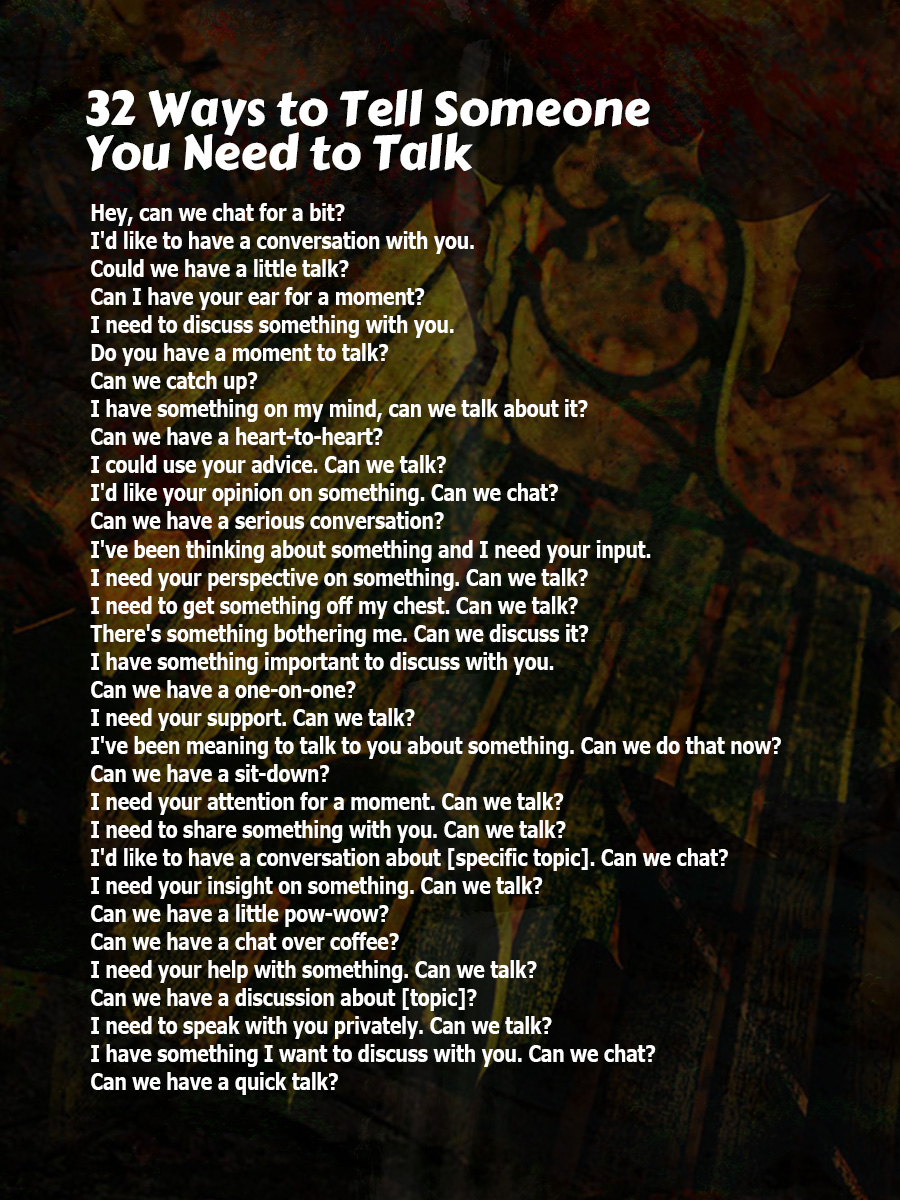Do you ever feel like you need to talk to someone, but you’re not sure how to say it? Maybe it’s a friend, a family member, or even a colleague. We all have moments when we need to share our thoughts and feelings with someone else. But expressing this need can sometimes be tricky. That’s why in this blog post, we’re going to explore some easy ways to tell someone you need to talk.
Communication is an important part of any relationship, whether it’s with a friend, a family member, or a co-worker. But it’s not always easy to find the right words to express ourselves. That’s why having some strategies to help you communicate your feelings can be really helpful.
In this article, we’ll discuss different ways you can approach the conversation, including how to choose the right time and place, how to express yourself clearly, and how to listen actively to the other person’s response. By the end, you’ll have some practical tips to help you have those important conversations with the people in your life. Let’s get started!

Here are 32 Ways to Tell Someone You Need to Talk:
- Hey, can we chat for a bit?
- I’d like to have a conversation with you.
- Could we have a little talk?
- Can I have your ear for a moment?
- I need to discuss something with you.
- Do you have a moment to talk?
- Can we catch up?
- I have something on my mind, can we talk about it?
- Can we have a heart-to-heart?
- I could use your advice. Can we talk?
- I’d like your opinion on something. Can we chat?
- Can we have a serious conversation?
- I’ve been thinking about something and I need your input.
- I need your perspective on something. Can we talk?
- I need to get something off my chest. Can we talk?
- There’s something bothering me. Can we discuss it?
- I have something important to discuss with you.
- Can we have a one-on-one?
- I need your support. Can we talk?
- I’ve been meaning to talk to you about something. Can we do that now?
- Can we have a sit-down?
- I need your attention for a moment. Can we talk?
- I need to share something with you. Can we talk?
- I’d like to have a conversation about [specific topic]. Can we chat?
- I need your insight on something. Can we talk?
- Can we have a little pow-wow?
- Can we have a chat over coffee?
- I need your help with something. Can we talk?
- Can we have a discussion about [topic]?
- I need to speak with you privately. Can we talk?
- I have something I want to discuss with you. Can we chat?
- Can we have a quick talk?
See Also: 28 Ways to Respond to “Nice to E-Meet You”
Starting The Conversation
To have an impactful and positive conversation, it’s vital to begin with starting the conversation effectively.
Choose The Right Time And Place
Select a time and place where both of you can have privacy and minimal disruptions.
Express Your Feelings Clearly
Use simple, direct language to communicate your emotions effectively.
Communicating Effectively
Communicating effectively is essential in any relationship, whether it’s with a significant other, friend, family member, or colleague. It’s important to convey your thoughts and feelings in a clear and respectful manner in order to maintain open and honest communication. When broaching a sensitive topic such as the need to talk, utilizing effective communication techniques can lead to a more constructive and empathetic conversation.
Active Listening
When you need to talk to someone, it’s crucial to practice active listening. Give the other person your full attention, maintain eye contact, and avoid interrupting them. Paraphrase what they’ve said to ensure you understand, and show empathy by acknowledging their emotions. This fosters a supportive atmosphere for the conversation.
Use ‘I’ Statements
Expressing yourself using I statements can prevent the other person from feeling defensive. For example, instead of saying “You never listen to me,” try “I feel unheard when I share my thoughts.” This helps to communicate your emotions without placing blame, promoting a more constructive dialogue.
Also Read: 28 Ways to Respond to “Nice to E-Meet You”
Being Respectful And Considerate
When it comes to having a difficult conversation with someone, it is essential to approach the situation with respect and consideration. By being mindful of the other person’s feelings and emotions, you can create a more conducive environment for open communication and understanding. In this section, we will explore two key aspects of being respectful and considerate when telling someone you need to talk: avoiding blame and showing empathy.
Avoid Blame
Blaming someone for a situation can often lead to defensiveness and hostility, making the conversation unproductive. Instead, focus on expressing your feelings and concerns without pointing fingers. Use “I” statements to convey how the situation impacts you personally, such as “I feel…” or “I am concerned about…”. This allows the other person to understand your perspective without feeling attacked. By avoiding blame, you create an atmosphere of understanding and collaboration.
Show Empathy
Showing empathy is crucial in any conversation, especially when discussing sensitive topics. Put yourself in the other person’s shoes and try to understand their point of view. Acknowledge their feelings and validate them by saying something like, “I understand that this might be difficult for you.” Showing empathy demonstrates that you care about their emotions and fosters a sense of trust and mutual respect.
Additionally, actively listening plays a significant role in demonstrating empathy. Pay close attention to their words, maintain eye contact, and nod or provide affirmations when appropriate. Avoid interrupting or dismissing their concerns, as this can make the person feel unheard or invalidated. By actively listening, you are showing that their opinions and feelings are valued.
Remember, being respectful and considerate sets the tone for a productive conversation. Avoiding blame and showing empathy create a safe space for both parties to express themselves and find common ground. By incorporating these two strategies, you can effectively communicate your needs while preserving the relationship with the other person.
Encouraging Open Dialogue
When you find yourself needing to have a serious conversation with someone, it’s important to encourage open dialogue. Creating an atmosphere where both parties feel comfortable expressing their thoughts and feelings can lead to a productive and meaningful conversation. Here are two ways to foster open dialogue and ensure that the conversation goes smoothly:
Encourage Their Perspective
One of the keys to open dialogue is to encourage the other person’s perspective. Take the time to actively listen to what they have to say and validate their feelings. By showing genuine interest in their point of view, you are more likely to create a safe space where they feel heard and understood. This not only helps to build trust but also allows for a deeper understanding of their thoughts and emotions.
Be Open To Compromise
In any conversation, it is important to be open to compromise. Remember that you are both individuals with unique needs and perspectives. Avoid becoming defensive or dismissive of the other person’s ideas or concerns. Instead, try to find common ground and work towards a solution that satisfies both parties. Being open to compromise shows respect and willingness to find a resolution that benefits everyone involved.
See Also: 36 Best Ways to Respond to “The Early Bird Gets the Worm”
Seeking Professional Help When Needed
If you are experiencing significant emotional distress or struggle to communicate your feelings effectively, it may be essential to seek professional help. Recognizing the signs that indicate the need for professional intervention and understanding the importance of therapy can have a profound impact on your mental well-being.
Recognize Signs Of Need
Recognizing the signs that indicate the need for professional help is crucial for maintaining emotional and mental well-being. Signs such as persistent feelings of sadness, anxiety, irritability, or a loss of interest in activities once enjoyed can signal the need for professional guidance. Additionally, if you find it challenging to cope with everyday stress or experience difficulties in maintaining relationships, seeking professional help may be necessary.
Importance Of Therapy
Therapy can play a pivotal role in addressing emotional challenges and promoting psychological well-being. Professional therapists can offer a safe and non-judgmental space for individuals to explore their emotions and develop coping strategies. Through therapy, individuals can gain insight into their thoughts and behaviors, learn effective communication skills, and acquire tools to navigate life’s challenges more effectively.

Conclusion
Communicating the need for a conversation is crucial for healthy relationships. By being direct and honest, you establish trust and open communication. Understanding the right timing and approach can make the conversation more effective. Remember to listen, stay calm, and acknowledge their feelings.
Effective communication sets the foundation for stronger connections.









